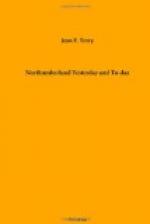LORD DERWENTWATER’S FAREWELL
“Farewell to pleasant Dilston Hall,
My father’s ancient seat;
A stranger now must call thee his,
Which gars my heart to greet.
Farewell each kindly well-known face
My heart has held so dear;
My tenants now must leave their lord
Or hold their lives in fear.
No more along the banks of Tyne
I’ll rove in autumn grey;
No more I’ll hear, at early dawn,
The lav’rocks wake the day;
Then fare thee well, brave Witherington,
And Forster ever true;
Dear Shaftsbury and Errington,
Receive my last adieu.
And fare thee well, George Collingwood,
Since fate has put us down;
If thou and I have lost our lives,
Our king has lost his crown.
Farewell, farewell, my lady dear,
Ill, ill thou counsell’dst me;
I never more may see the babe
That smiles upon thy knee.
And fare thee well, my bonny gray steed,
That carried me aye so free;
I wish I had been asleep in my bed
The last time I mounted thee;
The warning bell now bids me cease,
My trouble’s nearly o’er;
Yon sun that rises from the sea
Shall rise on me no more.
Albeit that here in London Town
It is my fate to die;
O carry me to Northumberland,
In my father’s grave to lie.
There chant my solemn requiem
In Hexham’s holy towers;
And let six maids of fair Tynedale
Scatter my grave with flowers.
And when the head that wears the crown
Shall be laid low like mine;
Some honest hearts may then lament
For Radcliffe’s fallen line.
Farewell to pleasant Dilston Hall,
My father’s ancient seat;
A stranger now must call thee his,
Which gars my heart to greet.”
Near to Corbridge the waters of the Tyne lave the ancient piers of the old Roman bridge which led to Corstopitum, the most considerable of the Roman stations in this region. The recent careful excavations have laid bare the evidence of what must have been a most imposing city, and many treasures of pottery, coins and ancient jewellery and ornaments, together with large quantities of the bones of animals, some of them identical with the wild cattle of Chillingham, have been brought to light. The famous silver dish known as the Corbridge Lanx, which was found at the riverside by a little girl in 1734, had evidently been washed down from Corstopitum. It is now preserved at Alnwick Castle. The antiquity of Corbridge is thus superior to that of Hexham, as far as may be known; but on the other hand, while Hexham in Saxon times grew to power, Corbridge declined. Yet, in its time, it was more than the home of a famous Abbey; it was a royal city, albeit the date of its elevation to royal rank coincided with the decline of the kingdom of which it was the final capital. When the fierce and ruthless internal quarrels, which




